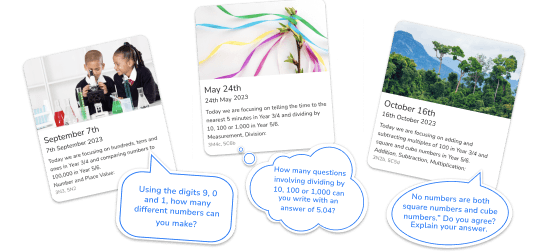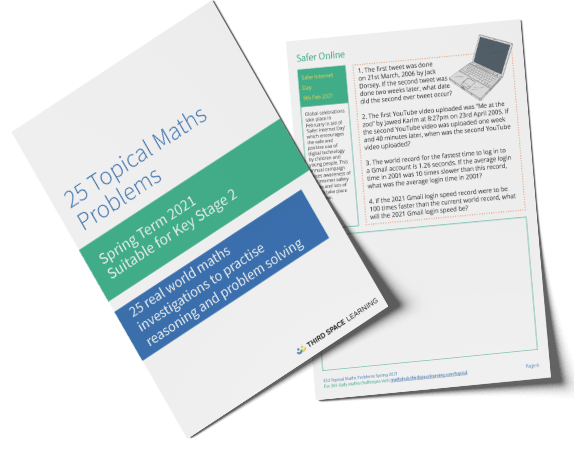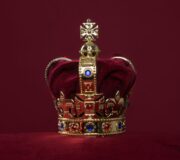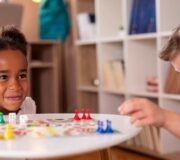British Science Week Maths Activities: Topical Maths [5]
This year, the 10th – 19th March 2023 means only one thing – British Science Week Maths activities!
To us here at Third Space Learning it’s an exciting opportunity to add British Science Week (BSW) to our roster of KS2 maths problem solving investigations on topical, calendar-based maths activities with the aim of increasing engagement in KS2 Maths.
For more Summer term 2023 activities linked to topical maths in the classroom, download your your free topical problem solving resource.
BSW is a ten day celebration of all things science, technology, engineering, and maths – with ‘fascinating, entertaining, and engaging events and activities across the UK for people of all ages’. For a taste of the inspiration and fun brought to communities all around the UK by BSW, see this video of 2016’s shenanigans.
Putting the M in STEM
Excitement aside, it’s imperative to remember that maths is an important part of the STEM block, and bleeds over into many aspects of it. It would be difficult to become an engineer without a sound understanding of mathematical principles, or a scientist without basic mathematics qualifications.
Indeed the ability to solve problems, which the 1982 Cockcroft Report describes as ‘the heart of mathematics’ is often the starting point of many STEM projects. What is the problem? How do I approach it? How do I solve it?
KS2 Topical Maths Problems for Spring Term 2023
20 Maths investigations linked to calendar dates, designed to develop reasoning and problem solving in your pupils
If, as the report suggests, ‘mathematics is only “useful” to the extent to which it can be applied to a particular situation’, then the importance of topical maths is clear. It is a way to bridge the gap between learning maths in the classroom and applying maths in the real world.
With this in mind here are three British Science Week-based maths investigations for you to try in your lessons.
Medicine Madness: George’s Marvellous Medicine
Roald Dahl’s famous book ‘George’s Marvellous Medicine’ is about how a young boy experiments with a strange concoction of ingredients which causes weird and hilarious changes in his grandmother.
He has to recreate the recipe in the story, and realises that even the slightest change would mean it wouldn’t work.
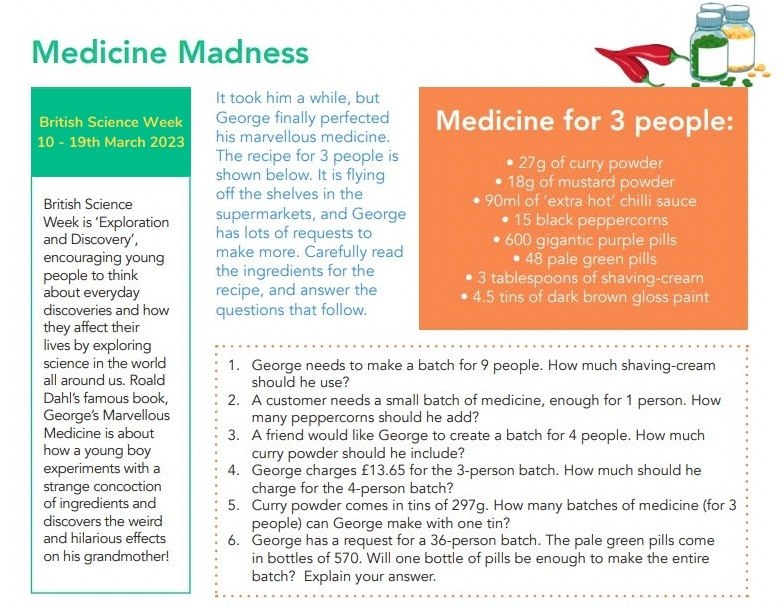
“It took him a while, but George finally perfected his marvellous medicine. The recipe for 3 people is shown below. It is flying off the shelves in the supermarkets, and George has lots of requests to make more. Carefully read the ingredients for the recipe, and answer the questions that follow.”
Medicine recipe for 3 people:
- 27g of curry powder
- 18g of mustard powder
- 90ml of ‘extra hot’ chilli sauce
- 15 black peppercorns
- 600 gigantic purple pills
- 48 pale green pills
- 3 tablespoons of shaving-cream
- 4.5 tins of dark brown gloss paint
Questions:
- George needs to make a batch for 9 people. How much shaving cream should he use?
- A customer needs a small batch of medicine, enough for 1 person. How many peppercorns should he add?
- A friend would like George to create a batch for 4 people. How much curry powder should he include?
- George charges £13.65 for the 3-person batch. How much should he charge for the 4-person batch?
- Curry powder comes in tins of 297g. How many batches of medicine (for 3 people) can George make with one tin?
- George has a request for a 36-person batch. The pale green pills come in bottles of 570. Will one bottle of pills be enough to make the entire batch? Explain your answer.
Third Space Learning’s online maths tuition lessons often include real world applications of maths, showing students how maths appears in other areas of study such as science and other parts of daily life.
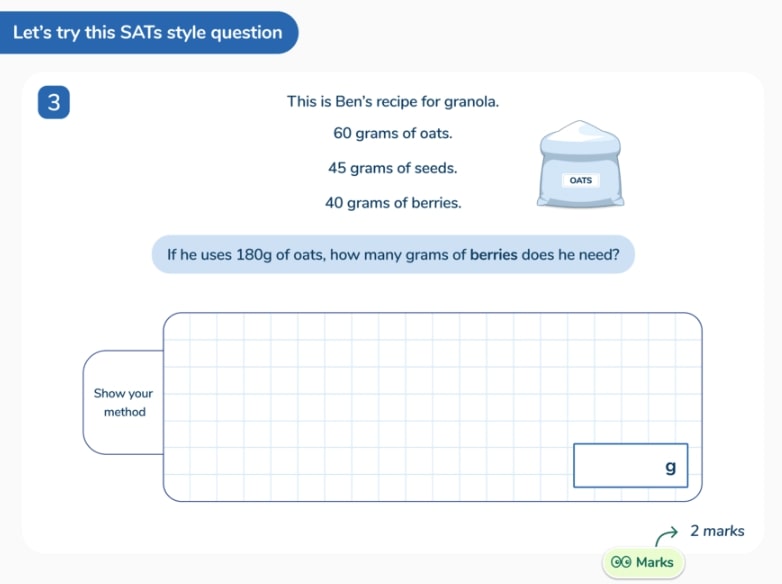
Climate Calamity
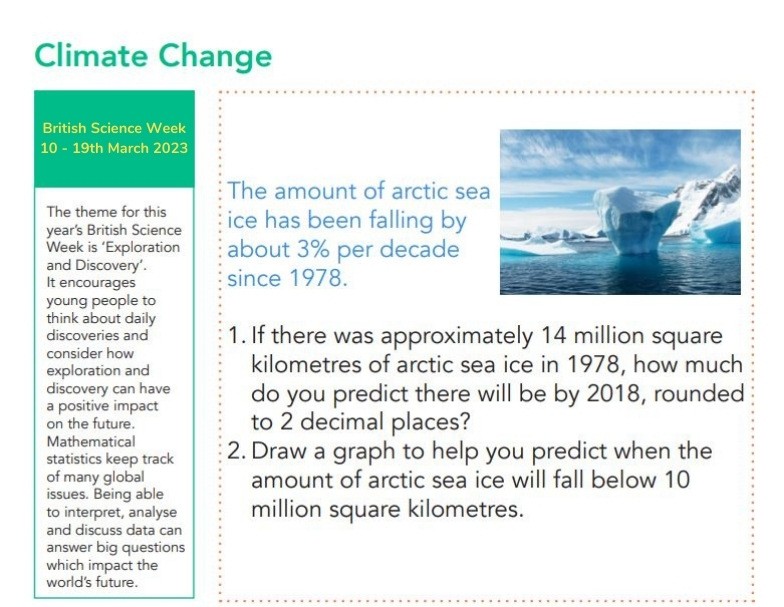
Mathematical statistics keep track of many global issues. Being able to interpret, analyse, and discuss data can answer big question which impact the world’s future. Analyse this information and, maybe, save the world!
The amount of arctic sea ice has been falling by about 3% per decade since 1978.
- If there was approximately 14 million square kilometres of arctic sea ice in 1978, how much do you predict there will be by 2018, rounded to 2 decimal places?
- Draw a graph to help you predict when the amount of arctic sea ice will fall below 10 million square kilometres.
Matchstick Maths
The 6 matchstick questions below form an investigation that can be done in lesson time which encourages your learners to look at how new shapes and meanings can be created through the smallest of changes.






Check out 20+ more fun topical Maths investigations KS2 in our blog: 5 Ways to Use Topical Maths to Improve Problem Solving and Reasoning.
DO YOU HAVE PUPILS WHO NEED MORE SUPPORT IN MATHS?
Every week Third Space Learning’s maths specialist tutors support thousands of students across hundreds of schools with weekly primary school tuition designed to plug gaps and boost progress.
Since 2013 these personalised one to one lessons have helped over 150,000 primary and secondary students become more confident, able mathematicians.
Learn about the emphasis on building a positive maths mindset or request a personalised quote for your school to speak to us about your school’s needs and how we can help.
